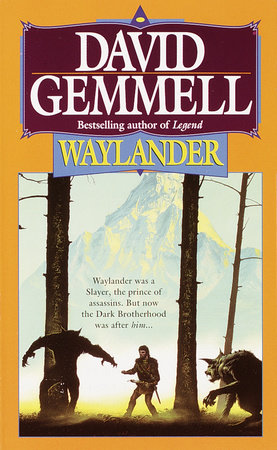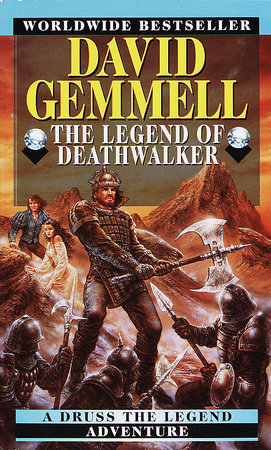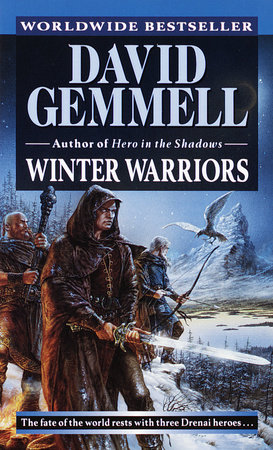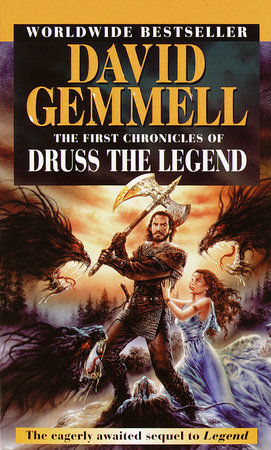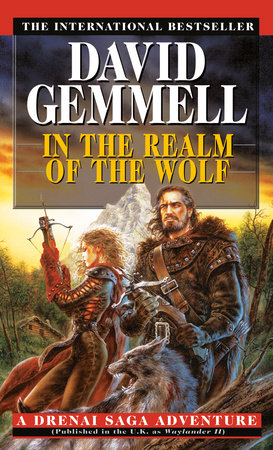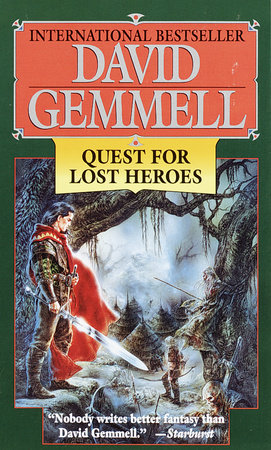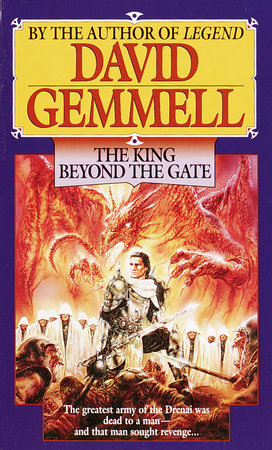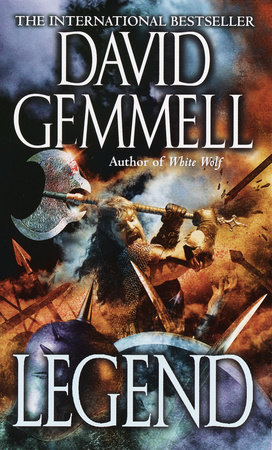Excerpt
Waylander
1
THEY HAD BEGUN to torture the priest when the stranger stepped from the shadows of the trees.
“You stole my horse,” he said quietly. The five men spun around. Beyond them the young priest sagged against the ropes that held him, raising his head to squint through swollen eyes at the newcomer. The man was tall and broad-shouldered, and a black leather cloak was drawn about him.
“Where is my horse?” he asked.
“Who is to say? A horse is a horse, and the owner is the man who rides him,” answered Dectas. When the stranger had first spoken, Dectas had felt the thrill of fear course through him, expecting to find several men armed and ready. But now, as he scanned the trees in the gathering dusk, he knew the man was alone. Alone and mad. The priest had proved but sorry sport, gritting his teeth against the pain and offering neither curse nor plea. But this one would sing his song of pain long into the night.
“Fetch the horse,” said the man, a note of boredom in his deep voice.
“Take him!” ordered Dectas, and swords sang into the air as the five men attacked. Swiftly the newcomer swept his cloak over one shoulder and lifted his right arm. A black bolt tore into the chest of the nearest man; a second entered the belly of a burly warrior with upraised sword. The stranger dropped the small double crossbow and lightly leapt back. One of his attackers was dead, and a second knelt clutching the bolt in his belly.
The newcomer loosened the thong that held his cloak, allowing it to fall to the ground behind him. From twin sheaths he produced two black-bladed knives.
“Fetch the horse!” he ordered.
The remaining two hesitated, glancing to Dectas for guidance. Black blades hissed through the air, and both men dropped without a sound.
Dectas was alone.
“You can have the horse,” he said, biting his lip and backing toward the trees. The man shook his head.
“Too late,” he answered softly.
Dectas turned and sprinted for the trees, but a sharp blow in the back caused him to lose balance, and his face plowed the soft earth. Pushing his hands beneath him, he struggled to rise. Had the newcomer thrown a rock? he wondered. Weakness flowed through him, and he slumped to the ground … the earth was soft as a feather bed and sweet-smelling like lavender. His leg twitched.
The newcomer recovered his cloak and brushed the dirt from its folds before fastening the thongs at the shoulder. Then he recovered his three knives, wiping them clean on the clothes of the dead. Lastly he collected his bolts, dispatching the wounded man with a swift knife cut across the throat. He picked up his crossbow and checked the mechanism for dirt before clipping it to his broad black belt. Without a backward glance he strode to the horses.
“Wait!” called the priest. “Release me. Please!”
The man turned. “Why?” he asked.
The question was so casually put that the priest found himself momentarily unable to phrase an answer.
“I will die if you leave me here,” he said at last.
“Not good enough,” said the man, shrugging. He walked to the horses, finding that his own mount and saddlebags were as he had left them. Satisfied, he untied his horse and walked back to the clearing.
For several moments he stared at the priest, then he cursed softly and cut him free. The man sagged forward into his arms. He had been badly beaten, and his chest had been repeatedly cut; the flesh hung in narrow strips, and his blue robes were stained with blood. The warrior rolled the priest to his back, ripping open the robes, then walked to his horse and returned with a leather canteen. Twisting the cap, he poured water on the wounds. The priest writhed but made no sound. Expertly the warrior smoothed the strips of skin back into place.
“Lie still for a moment,” he ordered. Taking needle and thread from a small saddlebag, he neatly stitched the flaps. “I need a fire,” he said. “I can’t see a damned thing!”
The fire lit, the priest watched as the warrior went about his work. The man’s eyes were narrowed in concentration, but the priest noted that they were extraordinarily dark, deep sable-brown with flashing gold flecks. The warrior was unshaven, and the beard around his chin was speckled with gray.
Then the priest slept …
When he awoke, he groaned as the pain from his beating roared back at him like a snarling dog. He sat up, wincing as the stitches in his chest pulled tight. His robes were gone, and beside him lay clothes obviously taken from the dead men, for brown blood stained the jerkin that lay beside him.
The warrior was packing his saddlebags and tying his blanket to his saddle.
“Where are my robes?” demanded the priest.
“I burned them.”
“How dare you! Those were sacred garments.”
“They were merely blue cotton. And you can get more in any town or village.” The warrior returned to the priest and squatted beside him. “I spent two hours patching your soft body, priest. It would please me if you allowed it to live for a few days before hurling yourself on the fires of martyrdom. All across the country your brethren are burning, or hanged, or dismembered. And all because they don’t have the courage to remove those damned robes.”
“We will not hide,” said the priest defiantly.
“Then you will die.”
“Is that so terrible?”
“I don’t know, priest, you tell me. You were close to it last evening.”
“But you came.”
“Looking for my horse. Don’t read too much into it.”
“And a horse is worth more than a man in today’s market?”
“It always was, priest.”
“Not to me.”
“So if I had been tied to the tree, you would have rescued me?”
“I would have tried.”
“And we would both have been dead. As it is, you are alive, and, more important, I have my horse.”
“I will find more robes.”
“I don’t doubt that you will. And now I must go. If you wish to ride with me, you are welcome.”
“I don’t think that I do.”
The man shrugged and rose. “In that case, farewell.”
“Wait!” said the priest, forcing himself to his feet. “I did not wish to sound ungrateful, and I thank you most sincerely for your help. It is just that were I to be with you, it would put you in danger.”
“That’s very thoughtful of you,” answered the man. “As you wish, then.”
He walked to his horse, tightened the saddle cinch, and climbed into the saddle, sweeping out his cloak behind him.
“I am Dardalion,” called the priest.
The warrior leaned forward on the pommel of his saddle.
“And I am Waylander,” he said. The priest jerked as if struck. “I see you have heard of me.”
“I have heard nothing that is good,” replied Dardalion.
“Then you have heard only what is true. Farewell.”
“Wait! I will travel with you.”
Waylander drew back on the reins. “What about the danger?” he asked.
“Only the Vagrian conquerors want me dead, but at least I have some friends, which is more than can be said for Waylander the Slayer. Half the world would pay to spit on your grave.”
“It is always comforting to be appreciated,” said Waylander. “Now, Dardalion, if you are coming, put on those clothes and then we must be away.”
Dardalion knelt by the clothes and reached for a woolen shirt, but as his fingers touched it, he recoiled and the color drained from his face.
Waylander slid from his saddle and approached the priest. “Do your wounds trouble you?” he asked.
Dardalion shook his head, and when he looked up, Waylander was surprised to see tears in his eyes. It shocked the warrior, for he had watched this man suffer torture without showing pain. Now he wept like a child, yet there was nothing to torment him.
Dardalion took a shuddering breath. “I cannot wear these clothes.”
“There are no lice, and I have scraped away most of the blood.”
“They carry memories, Waylander … horrible memories … rape, murder, foulness indescribable. I am sullied even by touching them, and I cannot wear them.”
“You are a mystic, then?”
“Yes. A mystic.” Dardalion sat back upon the blanket, shivering in the morning sunshine. Waylander scratched his chin and returned to his horse, where he removed a spare shirt, leggings, and a pair of moccasins from his saddlebag.
“These are clean, priest. But the memories they carry may be no less painful for you,” he said, tossing the clothes before Dardalion. Hesitantly the young priest reached for the woolen shirt. As he touched the garment, he felt no evil, only a wave of emotional pain that transcended anguish. He closed his eyes and calmed his mind, then he looked up and smiled.
“Thank you, Waylander. These I can wear.”
Their eyes met, and the warrior smiled wryly. “Now you know all my secrets, I suppose.”
“No. Only your pain.”
“Pain is relative,” said Waylander.


